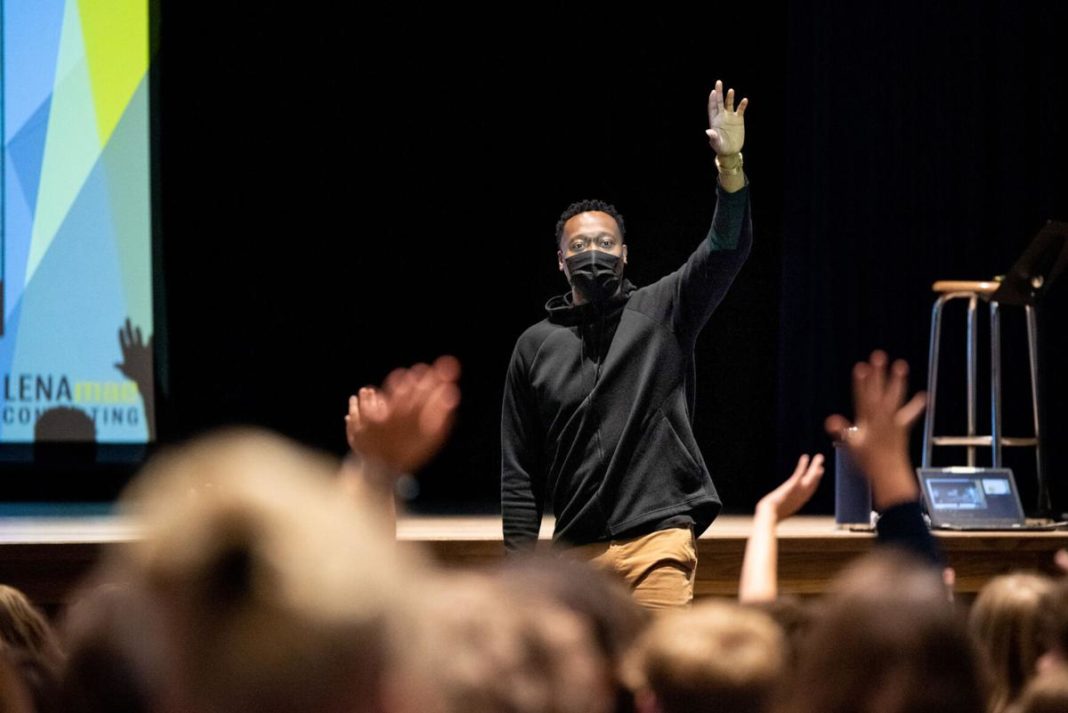Anthony Jones, Slippery Rock University’s first Chief Diversity Officer (CDO) received a call from a search firm last fall. He didn’t answer the call. Or the calls that followed.
That same number called him while he was on a drive and when he recognized that it was the number that he was ignoring, he finally picked up. This was the first moment that Jones gave SRU a chance.
Jones admitted that SRU wasn’t on his radar very much. He wasn’t actively searching for a new job either, necessarily.
At the time, Jones was the associate dean for diversity and inclusion at Thiel College. He had an intern that worked with him previously that spoke a lot about Slippery Rock, “the good and the bad,” Jones said.
From the start of the process, beginning with the search committee and the following interviews, Jones felt comfortable with who he was interacting with.
“[The interview] wasn’t serious at all. It never lost sight of what we’re here for,” Jones said. “It was a very eclectic group of individuals [in the interview] . . . which I found very intriguing as well.”
Jones was hired to implement SRU’s Diversity, Equity and Inclusion (DEI) Strategic Plan, as well as help with overall DEI efforts. But he would have never completed his undergrad, let alone a doctoral degree in educational leadership and policy studies from Eastern Kentucky University if it weren’t for the director of multicultural affairs at the University of Mount Union catching him skipping class.
“She laid into me, like actual curse words,” Jones said. “But there was something so familiar about that and it sounds crazy, but just like my mom who cussed me out, so it felt very motherly.”
At that moment, Jones promised he would stop by her office the next day. And he did, and the day after as well.
“Next thing I know, I came back the next semester,” Jones said. “I’m in organizations, I made friends and graduated.
“I owe that to her.”
Arriving to campus, Jones noticed the beauty of SRU almost immediately. He has been quick to notice some of the challenges that the physical design of the campus can bring.
“The campus, the structure of the campus if difficult to work with and I know a lot of those things aren’t fixes that will be easy,” Jones said. “I can’t imagine what it would be like for a student in a wheelchair on campus.
“The walks are difficult, let alone having to be on crutches or anything along those lines.”
Jones is having conversations across campus to try and ensure that there is a space for students who may need accommodations, visual or non-visual. That awareness, of how others can be disadvantaged in life due to circumstances beyond their control, came to be during a service trip to El Salvador during his senior year.
While there, Jones and others were staying with a family, sleeping in their chicken coop.
“But I met a group of people who had absolutely nothing and I literally thought that I grew up poor,” Jones said.
One night while sitting outside one of the few houses with electricity, Jones swore he could hear Nelly’s “Country Grammar” playing somewhere. Despite thinking he was imagining things, he searched for the sound.
Inside, Jones found a teenage boy playing American videos on a DVD player. The boy was using the videos to learn English. Using his little bit of Spanish, Jones and the boy struck up a conversation.
“At one point he was asking me about my comb, and again, we were instructed not to really talk about [things back home],” Jones said. “Then he asked me about a Playstation.”
Jones said he talked about the Playstation 2 he had back home. The one he rarely played and was collecting dust.
“His whole demeanor dropped,” Jones said. “He said what the price of a PlayStation, I can buy a house here.
“And I was just like, ‘Oh my goodness,’ like, it just shifted everything in me.”
For Jones, material things just don’t hold the same value for him as people, since waking up from the “fairy tale [he] was living in.” While it has helped him succeed academically and professionally, it has caused some tense moments in his personal life.
“Me and my partner go back and forth because I’m like, ‘We have too much stuff,’ and that bothers me because we’re not using it,” Jones said.
A large part of Jones’ plans in his new role is to work all across campus in a variety of areas. This includes with the President’s Commissions, the Office for Inclusive Excellence, and many other organizations to focus on DEI.
Jones said he tries to get out to as many events as his schedule allows, just to show support to the other staff members working to improve the campus.
“I don’t want to limit that [support] to Office of Inclusive Excellence, because that support will be across the board,” Jones said. “And I think that is a big, distinguishing piece as well as I’m going to be everywhere.”
William Behre, SRU president, talked about how Jones will help aid with the president’s goals for DEI.
“I’ve asked Dr. Jones to now look at other things he’s learned about and see what should percolate to the top.” Behre said. “And, and then we’re going to basically make a six to eight month goal list, and he’ll get started on those while he’s still learning more about our community, because he’s still new to the community, we have to remember that.”
Jones has made it clear that he is ready to put in the work to be CDO, and this is where he has eventually wanted to end up in his career. With experience in residential life and housing, admissions, conduct and multicultural affairs, he feels he has an understanding in various spaces.
“In my short time that I’ve been here, that has been extremely helpful in my conversations in helping me relate to individuals . . . and hopefully will help me with working with these individuals in the near future,” Jones said.








